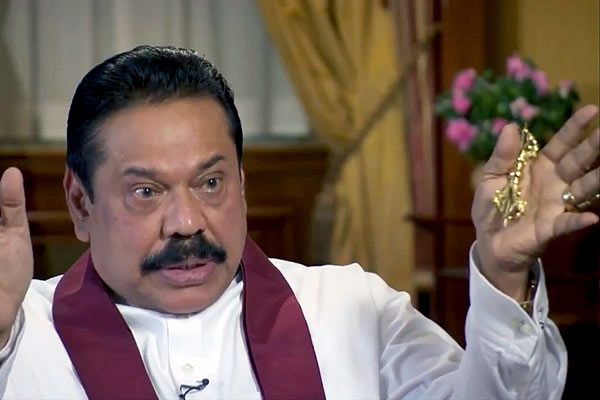MR urges people to be wary of sinister plans to divide country

Former President Mahinda Rajapaksa yesterday warned that some sinister forces, bent on destabilising the country, were trying to engineer another 1983 style conflagration to drum up international support for their constitutional reforms, aimed at dividing the country into several semi-independent states.
Rajapaksa said the gravitation of a section of the Muslim population towards communal political parties had made it easy for the siniser forces to create tensions between the Sinhalese and Muslims by using agent provocateurs.
“I call on citizens belonging to all communities to reflect intelligently on what has been happening and to refrain from
all acts of violence”, he said.
Following is the text of the ex-President’s statement:
Several violent incidents have taken place in Digana after a Sinhala truck driver died in hospital following an assault by a group of Muslim men. The police have made some arrests, but they are yet to be formally identified as the perpetrators of this murder. The full severity of the law should be brought to bear on those responsible. The government should provide adequate compensation to the family of the victim. Following the violent incidents that occurred in Digana, the body of a Muslim youth has been found in a damaged house. Thus two murders have now taken place. The government has imposed a state of emergency in the country. However, even at the time of issuing this statement, tensions have not abated completely. This is the second clash between the Sinhala and Muslim communities within a week. Just days ago there was an incident in Ampara. A few months earlier, there was the Gintota incident and several other incidents in 2017 as well.
The only one way to prevent these clashes is the strict enforcement of the law. Unrest is often generated by real or perceived police inaction in relation to a complaint. The police should respond to disputes or conflicts between different communal groups promptly and decisively. Above all, mob violence and collective punishments against uninvolved persons should be prevented at all costs. It is the task of the government to direct the police properly in handling such situations. The local and foreign forces seeking to destabilise this country are trying to engineer another 1983 style conflagration to drum up support for their constitutional reforms which seek to divide this country into several semi-independent states. I call on citizens belonging to all communities to reflect intelligently on what has been happening and to refrain from all acts of violence.
In the first few years after independence, Sinhalese, Tamil and Muslim leaders ruled this country together as partners. G.G. Ponnabalam had a warm and cordial relationship with the Senanayakes. That era ended in the mid-1950s as communalism and separatism came into Northern Tamil politics. In the past, the two main political parties had Muslim leaders like A.C.S. Hameed, M.H. Mohamed, Badiudin Mohamed and Alavi Moulana who were elected to Parliament not only by Muslims but also by Sinhalese voters. During those decades, tensions between the Sinhalese and the Muslims were virtually non-existent.
But since the late 1980s a section of the Muslim population has gravitated towards communal political parties. This has made it easy for conspiratorial forces both local and foreign to inflame tensions between the Sinhalese and the Muslims by using agents provocateurs. The tension that we see now between the Sinhalese and the Muslims is a fairly recent phenomenon. Everyone will remember that such tensions did not exist until about 2012. What was started by conspirators who are now in the yahapalana government, for the purpose of dislodging my government, now appears to have taken on a life of its own and mistrust between the communities is growing by the day.
Even though there are large numbers of Tamils in the north and east, the majority of the Tamil population permanently resides outside the north and east, among the majority Sinhalese. Similarly though there is a significant concentration of Muslims in the east, the vast majority of the Muslims permanently live outside the east, among Sinhalese and Tamils. What we are now experiencing is the mismatch between this demographic reality and communalist politics. The very logic of communal politics requires the portrayal of other ethnic and religious groups as enemies or rivals. Today, the situation is such that a dispute or clash between individuals belonging to different religions or ethnicities, automatically leads to a communal riot that spreads throughout the area.
Obviously this is not a situation that can be allowed to continue. There is a need to create in this country a nationalistic alliance comprising Sinhala, Tamil and Muslim leaders resembling the first post-independence government. This is not going to be an easy task given the poisonous contagion of communalism that has spread in this country over the past several decades. However on the basis of the recently concluded local government elections, I have reason to be cautiously optimistic that a window of opportunity exists to be able to turn back the tide of communalism. I intend initiating a dialogue in this regard with national minded Sinhala, Tamil and Muslim individuals and organisations in due course.
(Source: The Island)
Latest Headlines in Sri Lanka
- Sri Lanka to protect and develop 3.1 Billion-ton quartz reserve in Monaragala February 2, 2026
- Police Inspector, Constable arrested over missing gun at Matugama Police Station February 2, 2026
- Sri Lanka allows women to work at night as sanitary and food service workers February 1, 2026
- India pledges INR 4 Billion aid to Sri Lanka in 2026-2027 Budget February 1, 2026
- Shiranthi Rajapaksa summoned to FCID on February 3, 2026 February 1, 2026



I didn’t go through this big essay but what I would say, this culprit Mara is the back bone of this clashes for sure and it is obvious Mahinda is behind the scene. Well these sinhala buddhist should understand what is going on behind.